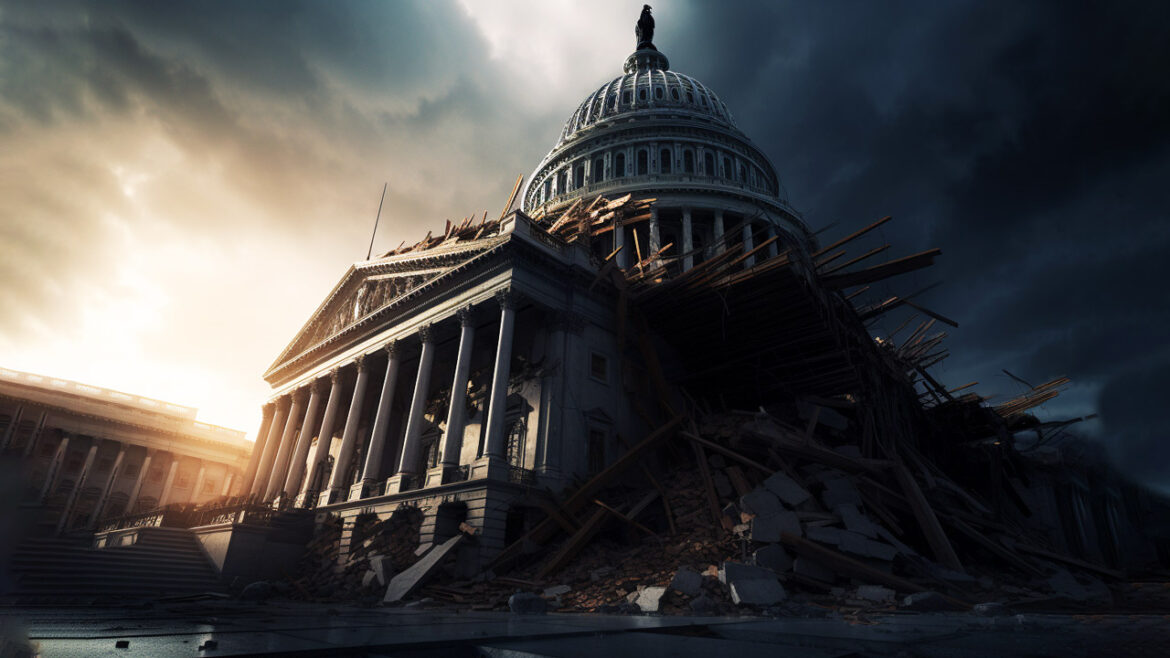Gold has all the potential to go unprecedentedly high. But silver will be gold on
Site:
Precious metals news
The Biden administration just ran the largest November budget deficit in history.And it managed this feat even with a 9% increase in government receipts.
The prospect of higher interest rates generally poses a challenge for non-interest-bearing assets like gold. However, the timing of rate cuts is crucial for gold's outlook. For 2024, gold is predicted to reach record levels, driven by a combination of factors: anticipated Federal Reserve rate cuts, strong demand from central banks, and gold's established role as a reliable hedge in times of geopolitical uncertainty. These elements together bolster a highly bullish view on gold for the upcoming year.
In this eye-opening video, Join Mike Maloney and Alan Hibbard as they delve into Argentina's currency crisis and its ripple effects on the global economic landscape.
The latest CPI report reveals a concerning trend of persistent inflation, casting doubt on the Federal Reserve's ability to cut rates in 2024. Inflation has been rising for five months, defying the expected downturn and indicating a prolonged inflationary period. This trend, especially in key sectors like housing and healthcare, suggests a more troubling economic outlook than previously anticipated, with significant implications for monetary policy and financial stability.
 Initial Jobless Claims Tumble Near 2023 Lows, but Continuing Claims Remain Near Two-Year Highs
Initial Jobless Claims Tumble Near 2023 Lows, but Continuing Claims Remain Near Two-Year HighsDec 14, 2023 - 06:00:14 PST
U.S. jobless claims unexpectedly dropped to 202k last week, a low for 2023, yet continuing claims increased modestly to 1.876 million, hovering near a worrying two-year high. This mixed labor market signal presents a significant challenge to the Federal Reserve's strategy, as it struggles to balance economic stability with rising employment concerns.
Dec 14, 2023 - 05:50:47 PST
British economist Charles Goodhart predicted a lasting return of inflation, contradicting the then-prevailing low rates. His 2020 book argued that demographic shifts and labor shortages would drive up prices and interest rates. Despite skepticism, given Japan's experience with aging and low inflation, Goodhart's views, based on his extensive experience and influence in economic policy, are hard to ignore. He warns that central banks must adapt to these changes and cautions about looming fiscal crises in major economies, indicating a challenging period ahead.
On the streets of Buenos Aires, Argentines are facing severe economic hardship due to drastic austerity measures and a dramatic over 50% devaluation of the peso. This shock plan, introduced by President Javier Milei's government to stabilize the economy, includes deep cuts in state spending, exacerbating a serious fiscal deficit. The steep devaluation of the peso is set to significantly worsen the already high inflation rate of nearly 150%, causing widespread financial distress among the population.
Wall Street traders and the Federal Reserve are finally aligned, anticipating a significant monetary shift as the Fed signals an end to its policy tightening. After projecting more aggressive interest-rate cuts in 2024, a notable rally in financial markets ensued. This rally, starting Wednesday and continuing into Thursday, saw global shares, front-end Treasuries, world currencies, gold and corporate bonds all experiencing significant gains.
 Yield-Curve Is a Problem for the Fed: Central Bank Might Ease Rates Sooner Rather Than Later
Yield-Curve Is a Problem for the Fed: Central Bank Might Ease Rates Sooner Rather Than LaterDec 14, 2023 - 05:24:58 PST
Chairman Jerome Powell's Federal Reserve has decided to maintain its target interest rate range at 5.25% to 5.5%, the highest level in over two decades. Despite this, the Fed's post-meeting statement, acknowledging the recent slowdown in inflation, coupled with forecasts from policymakers projecting lower rates by the end of the following year, suggests that the Fed might be considering easing monetary policy sooner rather than later. This decision comes amid concerns about an inverted yield curve, often seen as a precursor to a recession.
The Federal Reserve just surrendered to inflation.Fed officials won't call it a surrender. They're claiming victory. But surrender is the effect of the policy trajectory laid out by the Federal Open Market Committee (FOMC) at its December meeting.
The Bloomberg Dollar Spot Index fell to its lowest since August, dropping by 0.5%, following signals from the Fed about a faster pace of rate cuts than previously anticipated. The US central bank has maintained steady rates, with Chair Jerome Powell indicating potential hikes if inflation rises. However, the Fed is largely seen as ending its tightening cycle, shifting focus to when rate cuts should begin as inflation approaches their 2% target.
Gold is outperforming other commodities, with room for further growth beyond its current price of $2073 per ounce. This trend hints at a decrease in US geopolitical dominance, as the overreliance on the US Dollar in international commerce faces challenges. Nations are exploring alternatives to the Dollar, with gold emerging as a natural choice despite political resistance. The rising gold price reflects this shift towards gold in the global financial landscape. That's what gold is telling us.
Gold's appeal in Japan is surging, marking a significant shift since 1971 when President Nixon detached the dollar from gold. This detachment led to the gold price floating from $35 per troy ounce. Now, 51 years later, gold has reached $2,000 per troy ounce, a remarkable 57-fold increase against the US dollar. Currently, gold is priced around $1,980 per troy ounce. This trend underscores the contrast between the unlimited printing of fiat money by governments and the limited supply of gold, highlighting gold's enduring value and appeal as a stable investmen
Surging demand in China has pushed gold prices above international levels, driven by economic uncertainty and a weaker yuan. New York gold futures exceeded $2,100 per ounce, with Chinese prices now consistently higher than global benchmarks. This increase reflects gold's growing appeal in China as a stable investment amid domestic and global financial challenges.
 Inflation Here to Stay, Eroding Purchasing Power Indefinitely: Jim Grant
Inflation Here to Stay, Eroding Purchasing Power Indefinitely: Jim GrantDec 13, 2023 - 11:56:55 PST
Jim Grant, editor of "Grant's Interest Rate Observer," expects Federal Reserve Chair Jerome Powell to remain cautious due to persistent high inflation. Grant criticizes the Fed's previous underestimation of inflation and predicts gradual rate cuts, later than the market anticipates. The Fed, which misjudged inflation as "transitory" in 2021, raised rates 11 times since March 2022. Banks like ING and UBS forecast varying timelines for rate cuts, while the Fed plans a modest reduction in 2024.
 America on Path to Becoming World's Poorest Nation: Predicts Robert Kiyosaki
America on Path to Becoming World's Poorest Nation: Predicts Robert KiyosakiDec 13, 2023 - 11:50:24 PST
American entrepreneur Robert Kiyosaki, during a podcast interview, criticized the Biden Administration's policies, claiming that "America is going to be the poorest country in the world, starting now." Reflecting on his visit to Mumbai's slums, Kiyosaki noted the growing prevalence of similar conditions in America, indicating a significant decline in the country's living standards.
Dec 13, 2023 - 11:41:14 PST
The Federal Reserve's disregard for the quantity theory of money, which connects monetary supply with economic outcomes, seems flawed. The rapid increase in the money supply (M2) since 2020 led to high inflation, and its current sharp decline suggests an impending recession and possible deflation by 2025. This situation highlights concerns about the Fed's current monetary strategy and the risk of economic downturns.
The Federal Reserve has adopted a more dovish stance than anticipated, reducing its rate forecasts closer to market expectations. The median policy rate for 2023 is now set at 5.375%, with further decreases expected through 2026. This adjustment follows notable market movements, including a surge in stocks, gold, bonds and a dollar decline. There's uncertainty about how Fed Chair Powell will address market expectations for earlier rate reductions.
The U.S. retail sector faces a bleak outlook, potentially leading bankruptcies into next year due to persistent inflation and high interest rates. 2023 has already seen 591 corporate bankruptcies, the most since 2020, largely driven by the end of ultra-low interest rates. Many companies are teetering on the brink, unable to manage their debts in this challenging economic climate.
 Treasury Secretary Yellen Blames Bidenomics' Unpopularity to COVID Aftermath
Treasury Secretary Yellen Blames Bidenomics' Unpopularity to COVID AftermathDec 13, 2023 - 07:55:38 PST
Treasury Secretary acknowledges significant rent increases, a concern for many Americans. "Bidenomics," President Biden's economic policy brand, struggles to gain widespread approval. A Bankrate survey reveals that 50% of Americans feel their financial situation has worsened since the 2020 election, posing a challenge for Biden's re-election campaign. Only 21% see improvement, while 26% see no change.






